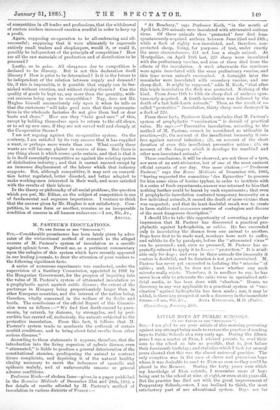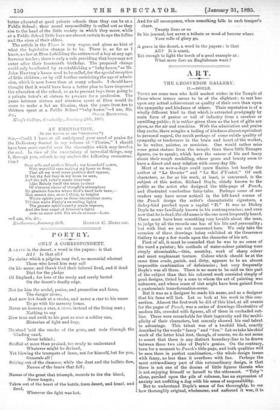L1T FLE BOYS AT PUBLIC SCHOOLS.
Lro THE EDITOR OF THE 'SPECTATOR "] SIR,—I am glad to see your article of this morning protesting against any attempt being made to restore the practice of sending boys to Public Schools at a very early age. During the fifteen years I was a master at Eton, I advised parents to send their sons to the school as late as possible, that is, just before their fornteenth birthday ; and statistics which I took for several years showed that this was the almost universal practice. The only exception was in the case of clever and precocious boys whom it was desirable to send to Eton as soon as they could be placed in the Remove. During the forty years over which. my knowledge of Eton extends, I remember cases of boys being sent to the school at nine, at eight, or even at six years old. But the practice has died out with the great improvement of Preparatory Schools,—now, I am inclined to think, the most satisfactory part of our educational system. Boys are far
better educated at good private schools than they. can be at a Public School ; their moral responsibility is called oat as they rise to the head of the little society in which they move, while at a Public School little boys are almost certain to ape the follies and the vices of their elders.
The article in the Times is very vague, and gives no hint of what the legislative change is to be. There is, as far as I know, no law at Eton forbidding the entrance of a boy at any age, however tender ; there is only a rule providing that boys may not enter after their fourteenth birthday. The proposed change could only be effected by re-establishing a" baby house," as Mr. John Hawtrey's house used to be called, for the special reception of little children ; or by still further restricting the age of admission, which is now lower than at many schools. I should have thought that it would have been a better plan to have improved the education of the school, so as to prevent boys from going to a private tutor's at sixteen to prepare for a profession. The years between sixteen and nineteen spent at Eton would do more to make a lad an Etonian, than the years from ten to thirteen spent at a Public School " baby-house."—I am, Sir,
Scc., O•iCA It BROWNIN G. King's C'al've, C,itheitlye, Janziaey :24t1,, 1885.



































 Previous page
Previous page